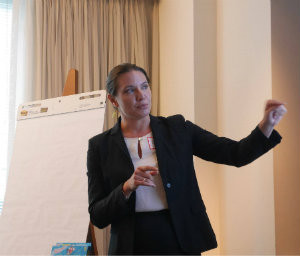 From right, JAHF's Amy Berman and Terry Fulmer, Jon Broyles of C-TAC, and Bud Hammes of Respecting Choices engage in the convening.
From right, JAHF's Amy Berman and Terry Fulmer, Jon Broyles of C-TAC, and Bud Hammes of Respecting Choices engage in the convening.Imagine Shirley, an 84-year-old woman with end stage renal failure. Her clinician has proposed continuing a daily dialysis treatment that will extend her life, but that is exhausting and uncomfortable. Overwhelmed by her condition, Shirley has little ability to articulate that she may want something different from her care, and her family is similarly unprepared to help her seek out or weigh any available alternatives—for example, medication and homecare.
What would it take to ensure that Shirley and the millions like her at the end of their lives each year receive the high-quality care that meets their unique needs? To help answer this question, the John A. Hartford Foundation (JAHF) recently convened a meeting at its offices in New York City focused on “End of Life and Serious Illness,” gathering leading innovators in the field and funders with deep interest in this area.
More than 85 percent of Americans who die each year are over 65, so JAHF’s interest in end-of-life and serious illness care is a natural extension of our traditional work in geriatrics. And like the funders and innovators gathered on June 2, we understand that this issue is not fundamentally about death, but promoting better care, indeed a better quality of life for those with serious illness.
We have proudly funded the transformative work of the Center to Advance Palliative Care (CAPC) for almost 10 years. We believe that the larger issue of palliative care for the seriously ill brings much to the discussion of end-of-life care. Still, as we concentrate more intently on the last phase of life, we believe that other resources, other approaches are needed, as well.
 John A. Hartford Foundation staff joined with innovators and funders in the field of end of life and serious illness care for the convening.
John A. Hartford Foundation staff joined with innovators and funders in the field of end of life and serious illness care for the convening.As part of our strategic direction, JAHF is committed to putting “geriatrics expertise to work” and promoting practice and policy change that improves the health of older people. And following more than a year of research, we believe that end-of-life and serious illness care represents one of the major practice areas that need improvement, most especially for older adults. It is also an area where we can see real opportunity for change with new models and a greater willingness among policymakers and the public to address these issues.
As the day’s facilitator, Anthony Back, MD, a Professor of Medicine at the University of Washington and leader of Vital Talk, reminded us, too often “medical care is indifferent to patients’ wishes” at end of life. While most of us want comfort, instead there are hospitalizations, procedures, stays in the intensive care unit, and multiple transitions. And the most recent data available suggests that the intensity of care for seriously ill people near death actually rose between 2000 and 2009. This is true even in conditions such as cancer, where prognosis should have improved, and dementia, where most would agree that comfort care at end of life is best.
 Brynn Bowman, director of education for CAPC, makes a point during the convening.
Brynn Bowman, director of education for CAPC, makes a point during the convening.Further, care is often not well organized to meet the needs of families and patients at end of life. Through personal experience or through stories from family, friends, and others, almost all of us understand how often people receive disjointed care and fragmented communication. Imagine the crisis of confidence this can evoke when families are trying to deal with the impending loss of a loved one. Simply put, clinicians are not sufficiently trained to have the necessary conversations to help their patients plan and realize their personal goals of care. Further, too many families are not able to have the honest advanced care planning discussions needed to be active and supportive members of the care team.
Led by Senior Program Officers Rachael Watman and Amy Berman, JAHF has been exploring how it can contribute to improved end-of-life and serious illness care. We have engaged and visited some of the strongest actors in the space and examined the benefits of their work for older adults. We have admired and studied the pioneering work of the Robert Wood Johnson Foundation and Open Society Institute, now known as the Open Society Foundations, in this area. We have learned about the groundbreaking efforts of such groups as Respecting Choices, The Conversation Project, Harvard University’s Serious Illness Care Program, the Coalition to Transform Advanced Care (C-TAC), National POLST, Vital Talk, and many others.
The June 2 convening, which brought together representatives from several of these trail-blazing groups, was an extension of this learning process. It provided us with the opportunity to discuss several cross-cutting themes and questions:
- What represents high-quality, person-centered health care services?
- How do we better facilitate end-of-life conversations?
- What are the workforce and training considerations around this care?
- What kind of payment and policy reform is needed?
- What metrics are required to evaluate this care effectively?
- How do we serve diverse populations appropriately?
And while all of the innovators in the room knew of each other’s work, several noted that it was the first time that they were able to come together and discuss how to move the whole field forward. I would like to thank the innovators who attended the convening:
- Anthony Back, MD, Vital Talk
- Brynn Bowman, CAPC
- Jon Broyles, C-TAC
- Susan Block, Dana-Farber Cancer Institute
- Bud Hammes, Respecting Choices
- Amy Vandenbroucke, POLST
- Ellen Goodman, The Conversation Project
I would also like to thank the other foundations who had representatives take part in the convening: Kate O'Malley, California Healthcare Foundation; Elyse Salend, Cambia Health Foundation; Lauren Weisenfeld, The Fan Fox & Leslie R. Samuels Foundation; Dominick L. Frosch, Gordon and Betty Moore Foundation; Josh Rising, The Pew Charitable Trusts; Archstone Foundation; Retirement Research Foundation; Sterling Speirn, Stupski Foundation; and Dara Hessee, The Colorado Health Foundation.
Informed by the meeting’s provocative conversation, JAHF’s approach to this work is still developing. We are commissioning a white paper and will hold monthly calls with funders. We want to augment the impact and increase the scale of all of the key players in this space. This may mean direct support, but also infrastructure to coordinate the field into a more coherent whole. We are also interested in gathering and coordinating the passion of the many John A. Hartford Foundation Change AGEnts who care deeply about end-of-life issues.
We approach this work as we approach all of our work. We recognize that collaboration is the only way to press large-scale, national or regional change forward. We realize that we have much to learn and to gain from intensive partnership with innovators and other funders that are already doing critically important work.
The convening in New York City was the culmination of a significant research phase on end-of-life and serious illness care. It is also the beginning of a vital and collaborative effort that is central to our mission and furthers our work to improve the health and lives of older adults.
